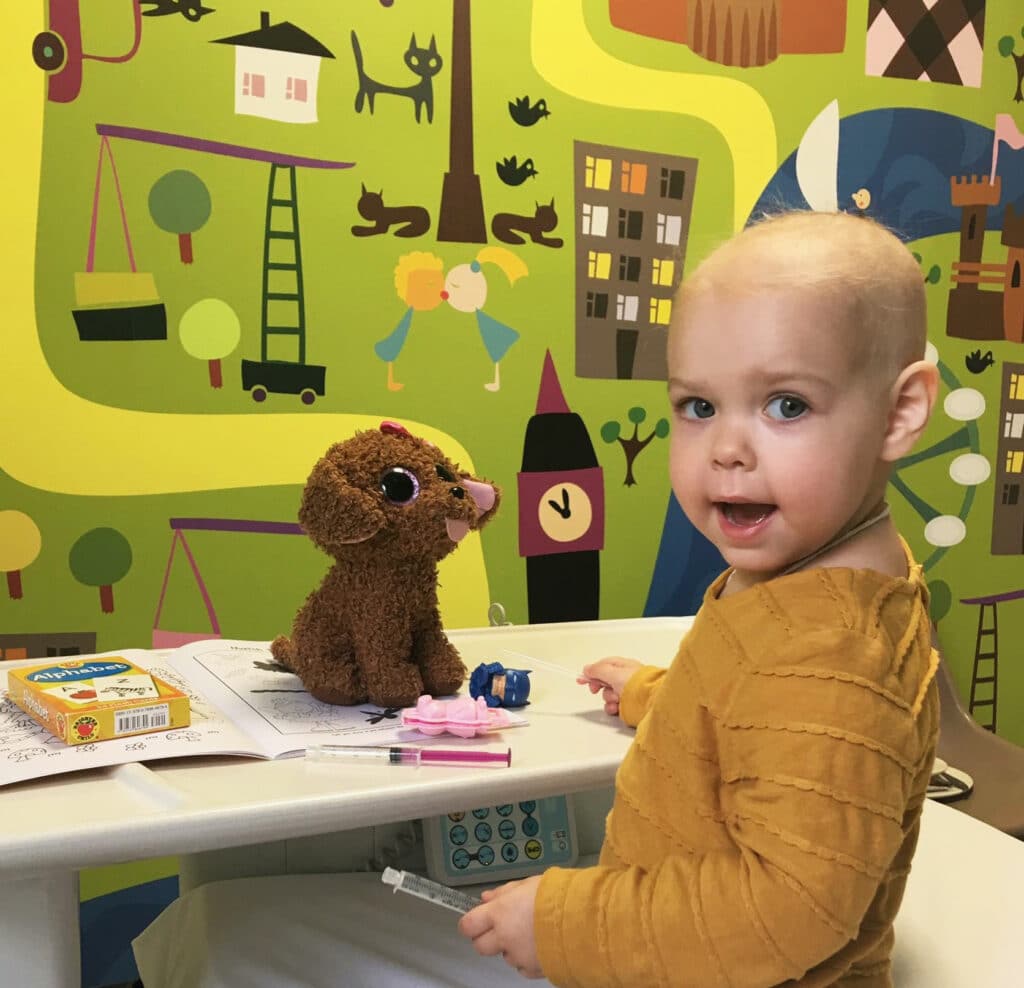Five-year-old cancer survivor left with tremor after treatment
Smiling Sophia recently celebrated her fifth birthday by finishing treatment for acute lymphoblastic leukaemia (ALL). However, her cancer journey is far from over with the five-year-old still suffering from the ill effects of a gruelling two and a half years of chemotherapy.
October 2019

Sophia, from Buckinghamshire, was diagnosed with acute lymphoblastic leukaemia in June 2017 at just two years old. Her treatment included regular high dose chemotherapy, blood and platelet transfusions, lumbar punctures and steroid medication.
Her mother Gemma Bird said:
The side effects of treatment were really tough for Sophia. She suffered a seizure related to one of the treatments and was unable to walk for several months, she also has a persistent tremor in her hands. MRI results have shown changes within her brain which continue to have a lasting neurological impact on her day-to-day skills.
The chemotherapy intoxicated her body to the point where she couldn’t grip a pen or walk and the tremor in her hand prevented her from getting food to her mouth.
The family were supported throughout Sophia’s diagnosis and treatment by childhood cancer research charity Children with Cancer UK. Sophia’s treatment also involved participation in an acute lymphoblastic leukaemia trial – UKALL 2011 – funded by the charity.
I first heard of Children with Cancer UK on the hospital ward – it was probably one of the many sleepless nights I had where I stayed up researching different treatments. I came across the charity and read about work they do to find better, kinder treatments for children with cancer. Sophia was also part of an ALL trial the charity funded, Gemma said.
On the 12th of September, one day before her fifth birthday, Sophia rung the End of Treatment Bell at Wexham Park Hospital. She was the first child to ring the bell at the Berkshire hospital, symbolising the end of her treatment and the beginning of her new life after cancer.
We’ve thought about this day ever since Sophia’s diagnosis, ever since we knew there was a bell to be rung. To finally see Sophia ring the bell was incredibly special but we know this is not necessarily the end of the road, Gemma said.
There is a perception that once a child finishes their treatment, takes that last dose of chemotherapy and rings the end of treatment bell that their battle with cancer is over. The reality is Sophia will face ongoing side effects from the harsh treatments.
But Sophia is very resilient and take everything in her stride. She’s already faced many challenges and her fighting character means she never lets anything stop her from living life to the full.
Children with Cancer UK Acting CEO Mark Brider said:
Childhood cancers are very different to those found in adults, but all too often doctors have to rely on treatments designed for adults, not children. This can leave children facing lifelong health problems as their small bodies struggle to cope with toxic medicines.
This makes childhood cancer research vital to improving survival rates as well as quality of survival so children like Sophia don’t have to face long-term effects from treatment.
BREAKOUT
A recent survey of 2,000 UK adults, commissioned by Children with Cancer UK, found that three in 10 UK adults are unaware of the long-term side effects of childhood cancer:
- 72% did not realise childhood cancer treatment could cause cognitive impairment
- 56% did not know suffering from childhood cancer could lead to secondary cancer later in life
- 54% did not realise childhood cancer could cause infertility later in life
- 62% did not know suffering from cancer at a young age could cause growth impairment
- 70% did not realise cancer treatment could cause behavioural issues
- 53% were unaware of the potential impact of childhood cancer treatment on the mental health and wellbeing of children.
The survey ‘Touched by Cancer’ was conducted by OnePoll.com.